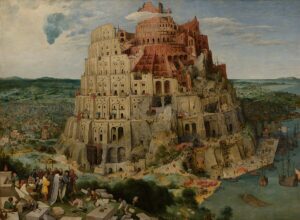 The Internet has evolved as a Tower of Babel.
The Internet has evolved as a Tower of Babel.
The Tower is collapsing.
It’s doing so in two ways.
The first is geographic collapse. Many nation states want to control not only what people do, but what they think, within their territories. This isn’t just an issue of censorship. Every society has boundaries of acceptable behavior.
But it’s also an issue of censorship. Forbidding people from thinking, or saying, thoughts the current political leadership finds unsavory is destructive. Economic growth in a technology age is defined by the number of trained, empowered minds you have. Putting them in a cage diminishes them. That’s why the U.S. keeps bringing in the best of them.
Search engines can limit this balkanization. Google may be blocked in China, but it goes both ways. People outside China seldom visit Chinese web sites, except to shop. China is outside the global conversation.
It’s this conversation that is undergoing the second collapse.
Social networks emerged in the last decade to bridge many gaps between people. I have been working with them since the 1980s. I followed the connections to Usenet, to America Online, to Yahoo, eventually to Facebook and Twitter.
The lesson I take from this is that moderation is necessary for communication to succeed. Verbal violence is no more useful than real life violence in bridging the gaps between people.
But fewer people accept that in this century.
The collapse of Twitter is a cautionary tale. One man, born of South African apartheid, took it upon himself to destroy it. Business follows the golden rule. He who has the gold makes the rules. The lesson is clear. As with open source, no business’ promise of an open forum can be fully trusted.
That’s why I have switched to the Fediverse, and its ActivityPub system. It’s true that Mastodon lacks the algorithm for engagement that privately-owned systems have used against online conversation. As a result, it feels smaller than it is. I must follow people to hear them. Mastodon isn’t good at bringing new voices to my ear. Maybe that will change.
What’s happening online reflects the real world. Democracy, capitalism, and individual liberty are under attack from forces who can succeed only within their states, by identifying others as enemies, but who promise nothing but the war of all against all that is killing the planet.
For Earth to survive, freedom must win. Online as well as offline.










